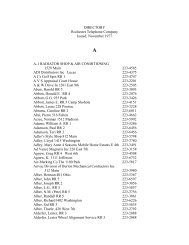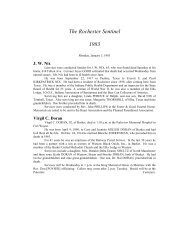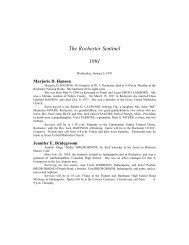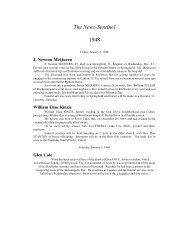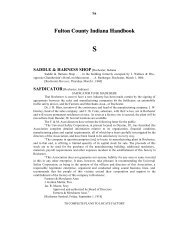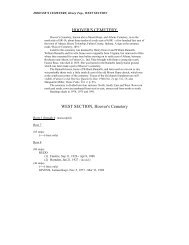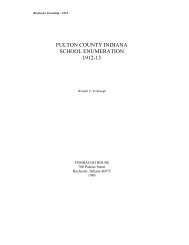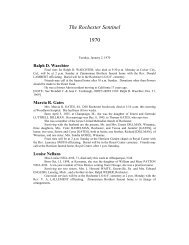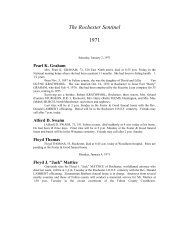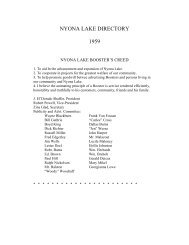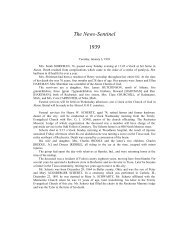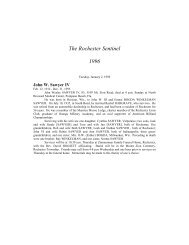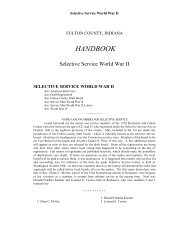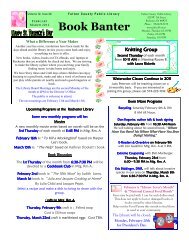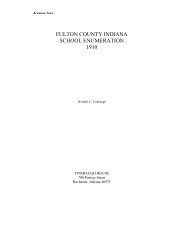Handbook N-P - Fulton County Public Library
Handbook N-P - Fulton County Public Library
Handbook N-P - Fulton County Public Library
You also want an ePaper? Increase the reach of your titles
YUMPU automatically turns print PDFs into web optimized ePapers that Google loves.
Pe<br />
well, by all pulling together for good. Then came the exciting time of 1840. About all I<br />
remember of it is the hurrahing for “Tippecanoe and Tyler too.”<br />
About that time Father bought a two-year old colt for $25.00. With it and the old<br />
Pennsylvania horse, he commenced farming on a small scale. Later he got another horse and<br />
advanced by slow degrees until 1844, which was the campaign of Polk and Clay, which I<br />
remember well. They had what they called “fandangoes,” and “rallies.” There was one at<br />
Hagerstown and Gov. James Whitcomb was to speak. I was anxious to see a Governor, as I<br />
thought he would be an exrardinary personage, but to my great surprise he was just a man like<br />
other men, although said to be very intelligent.<br />
By that time father had acquired a little money and began to look about for a permanent<br />
home. He heard of what was then called Tippecanoe country, so he came to <strong>Fulton</strong> county late in<br />
the fall of 1844. He looked around for a time and bought eighty acres north of Tippecanoe river,<br />
in Newcastle township half a mile west of where the Lutheran church now stands. It was a dense<br />
forest, covered with tall timber of beach, walnut, oak, ash and other varieties. One-half acre was<br />
cleared and had a brush fence around it. In 1845, about the middle of October, we started for our<br />
new home. We were five days on the trip, passing through Munceytown (Muncie), Jonesboro,<br />
Marion, through Indian reservation, which was then a thick forest, the road almost impassable, and<br />
arrived at Peru. That was the last pay day for the Indians, for their lands. Broadway, from the old<br />
bridge to Main street, was full of drunken Indians, both bucks and squaws.<br />
The next day, being Saturday, we arrived in Rochester about dark. We were unable to<br />
find a place to stay on account of our stock, which consisted of five horses, four cows and six<br />
sheep, so we started north. Father being over the route before, remembered that there was a house<br />
just north of the river, then called the old Polk place, now owned by Wm. H. Deniston. No one<br />
lived there, but seeing a light still farther north, we went on and came to what is now known as the<br />
Scott farm. Wm. T. Polk lived there then. Here again they refused to keep us, but on explaining<br />
the siuation, and expecting to become neighbors, he kindly let us stay and we became close<br />
friends. It was about nine o’clock by that time, and having had nothing to eat since noon, it is easy<br />
to imagine we were a hungry set. After supper we went to bed, or rather laid down to rest.<br />
The next morning, being Sunday, about four o’clock, father and I started up the river to<br />
the farm of James Richter, across the road from my home farm, to ask them to prepare breakfast<br />
for the family and teamster. At about nine o‘clock they arrived and all had breakfast. We were<br />
very anxious to land at our own place, so father, my older brothers and I started out. It was a mile<br />
and one-half, mostly through the woods. When found, it was as described before. We were well<br />
pleased for it was the first foot of real estate we ever owned. The next day we looked for a house,<br />
and found a log cabin just west of our land and moved in the same day. After procuring some feed<br />
for the stock for the winter, we began the building of a house on our land and employed a number<br />
of men for that purpose at 50c a day. The house was of hewed logs, 20x24 feet, one and one-half<br />
story, with clap-board roof nailed on, something quite new in those days. We had three rooms,<br />
two down and one up stairs. For a number of years that was the best house in the neighborhood.<br />
We moved into it some time in February, 1846.<br />
After preparing the ground for spring crops, garden and orchard, we rented some fields a<br />
few miles south of us, where there was cleared land. By this time our money was again all used<br />
and we went to hunting ginseng which brought 28 cts. a pound. The same now brings about $6.00<br />
a pound. In this way we were able to procure some groceries and much needed clothing.<br />
Our crops did fairly well, but one crop never failed for seven years, that was fever and<br />
ague. At times we were all down but mother.<br />
Wild game was plentiful, consising of deer, turkeys, squirrels and other animals. I have<br />
seen from two to three deer in a drove, but as there were no hunters in our family, they were of<br />
little use to us.<br />
There were no laid out roads east of the Michigan road. If we wanted to go in any<br />
direction we blazed a road, cut the brush and bumped over stumps as best we could. With all<br />
these privations, people enjoyed themselves as much as they do now.



